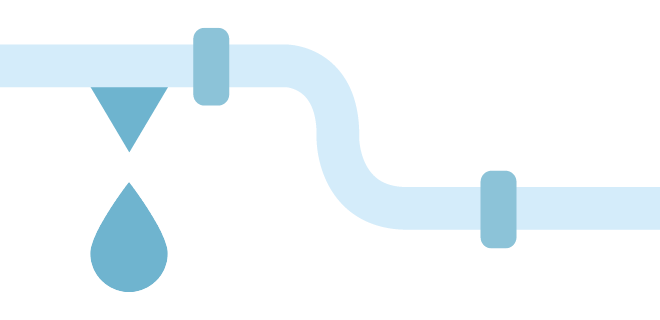Why smart meters?
Save water & reduce your bill
We are currently developing the capability for us to share the smart meter data with you. When this is ready, and the meter is active, a detailed breakdown of your usage across the day will be visible on your online account.
If your water usage seems higher than expected, we may get in touch to see if we can help.
Reduce your water usage and save money on your bill with our water saving tips.

Reduce Leakage
We're working towards halving our leakage by 2050. Smart metering will help us in understanding leakage on the customer side.
As smart meters can see hourly meter readings, it will be able to indicate if you are continuously using water through the day and night which is normally a sign you have a leak. If a leak isn't fixed, it can cause significant damage to your property.
We may be in contact with you to let you know if we have detected a constant flow of water.

Help the environment
Smart Metering will support in reducing leakage and water use, protecting water resources for the future.
Smart Meters can be read remotely through our smart meter network, meaning fewer vans on the road to collect readings and a smaller carbon footprint.

When will I get a smart meter?
We'll be upgrading meters installed before 2020 over the next 5 years. If your meter was installed after 2020, we won't be exchanging it at this time.
| Location postcode area | Planned date |
|---|---|
| Sheffield | January 2025 - March 2027 |
| Wakefield and Doncaster | April 2026 - March 2027 |
| Leeds | April 2026 - March 2028 |
| Bradford, Harrogate | April 2027 - March 2028 |
| York | April 2027 - March 2029 |
| Hull, Darlington and Halifax | April 2028 - March 2029 |
| Huddersfield | April 2028 - September 2029 |
| All remaining areas | April 2029 - September 2029 |
We'll be working in partnership with Netmore and Morrison Water Services to install the meters and develop a network for the meters to remotely connect to.
If you live in one of the listed postcode areas and have an indoor meter, a representative from Morrisons Water Services may contact you from 0800 024 1433 to schedule an appointment. Alternatively, you might receive a letter with instructions on how to book your appointment.
We'll be starting with the postcode areas: S1, S2, S3, S4, S5, S6, S7, S8, S9, S10, S11, S12, S13, S14 and S17. Feel free to call MWS at 0800 024 1433 to book your appointment today if you have an indoor meter and live in any of these postcode areas.


What do I need to do?
Indoor meters
If your meter is inside your home, we’ll be in touch to arrange an appointment to upgrade your meter.
Outside meters
If your meter is outside your home, you won’t need to be there for when we exchange your meter, but we’ll let you know when it’s been upgraded.
Don’t have a meter?
You can request a meter to be installed and we’ll fit a smart meter.
Any questions?
When will you start collecting data?
We’ll start collecting data once our smart infastructure is set up – this could be up to 6 months after your smart meter is installed.
I already have a water meter, can I switch to a smart meter?
We'll be upgrading meters installed before 2020 over the next 5 years. If your meter was installed after this time we won't be exchanging it at this time.
How do I know if my home has a smart meter?
If you have one of these devices on your meter, it will be smart:


We'll have written to you or left a calling card if your property was having a smart meter fitted.
If you’re unsure whether you've have been upgraded to a smart meter, check the back of your latest bill or give us a call on 0345 1 25 25 20.
I am moving into a house with a smart meter, do I have to use the meter?
Yes, if your home already has a smart meter you'll have to use it. Properties built after 1990 have been fitted with water meters and from 2023 new build properties will be fitted with a smart meter.
If you're worried about paying your bill, there are ways we can help.
I've had a smart meter fitted, will my billing change?
How often you receive your bill will not change, however smart meter data will allow us to bill you more accurately on your actual meter readings rather than estimating.
Please note, if your smart meter is unable to send us regular readings, we may have to estimate your bill.
What information do smart meters collect?
We only collect information about the water that flows through your smart meter.
You can find out more about the data we collect in our smart meter privacy policy.
Can I see the data collected by my smart meter?
We are currently developing the capability for us to share the smart meter data with you. Once this is ready, you'll be able to see the data in your online account.
Are smart meters safe?
Yes, Public Health England has advised the radio waves produced by smart meters don't pose a risk to health. Our smart meters are low powered, emitting far fewer radio waves than a mobile phone. They comply with UK and EU safety regulations.
What sort of energy is emitted from the device?
The emission power of the Itron radio modules is limited to 25mW, which is 12 times less than that of a GSM mobile phone (radiated power up to 300mW) and 10 times less than that of a cordless phone (radiated power peaks at 250 mW). Those devices are held to the ear, while a smart meter is located away from the user, often outside the property. Power is therefore minimised. In LoRaWAN, the meter’s radio module only wakes up a few times per day (4 times in standard configuration) to broadcast its data in a short communication, less than 3 seconds. so the 25mW emision only happens for 12 seconds per day in total.
Will I be getting a display to show my usage like my energy smart meter?
No, you will not be provided a separate display like your energy smart meter.
We're currently developing the capability for us to share the smart meter data with you. Once this is ready, you'll be able to see the data in your online account.
Can I opt out of smart metering?
Customers won’t be able to opt out of the smart meter rollout. We are only rolling this out to customers who are already on a meter or if a new meter is being installed. We won't be making customers switch to a meter if they don't already have one.

